Why is it that, just because I work with food, every person I meet feels the need to inquire about my favorite thing to cook?
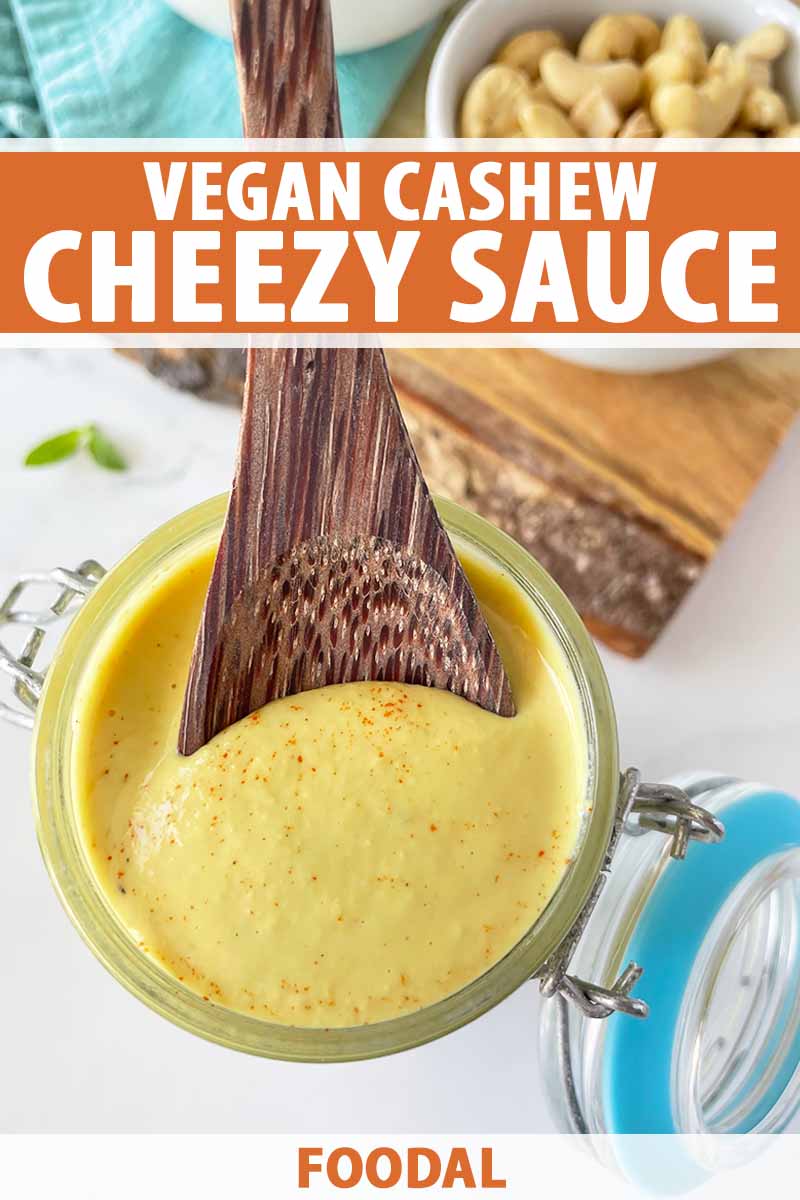
You might as well just ask if I’ve seen the movie “Ratatouille.” (And yes. I am familiar with the little Parisian rat who cooks with saffron.)
While I might have a tough time pinpointing one specific dish I’m consistently delighted to cook, I can conclusively tell you the only food I’d need with me on a deserted island.
Wait. Do chips and queso count as one food?
A silky, savory cheese sauce is the epitome of comfort to me. This wasn’t something my food-obsessed family ever prepared from scratch or anything. But I’ve been obsessed with takeout Mexican food since my teens.
At the ripe age of fifteen, I remember sitting in my best friend’s bonus room after school with oily paper bags of warm tortilla triangles and Styrofoam cups filled to the brim with green chili-dotted queso. The portion size of this sticky dip from our beloved Las Margaritas restaurant was generous, but we each insisted on getting our own serving to partake in this weekly tradition.
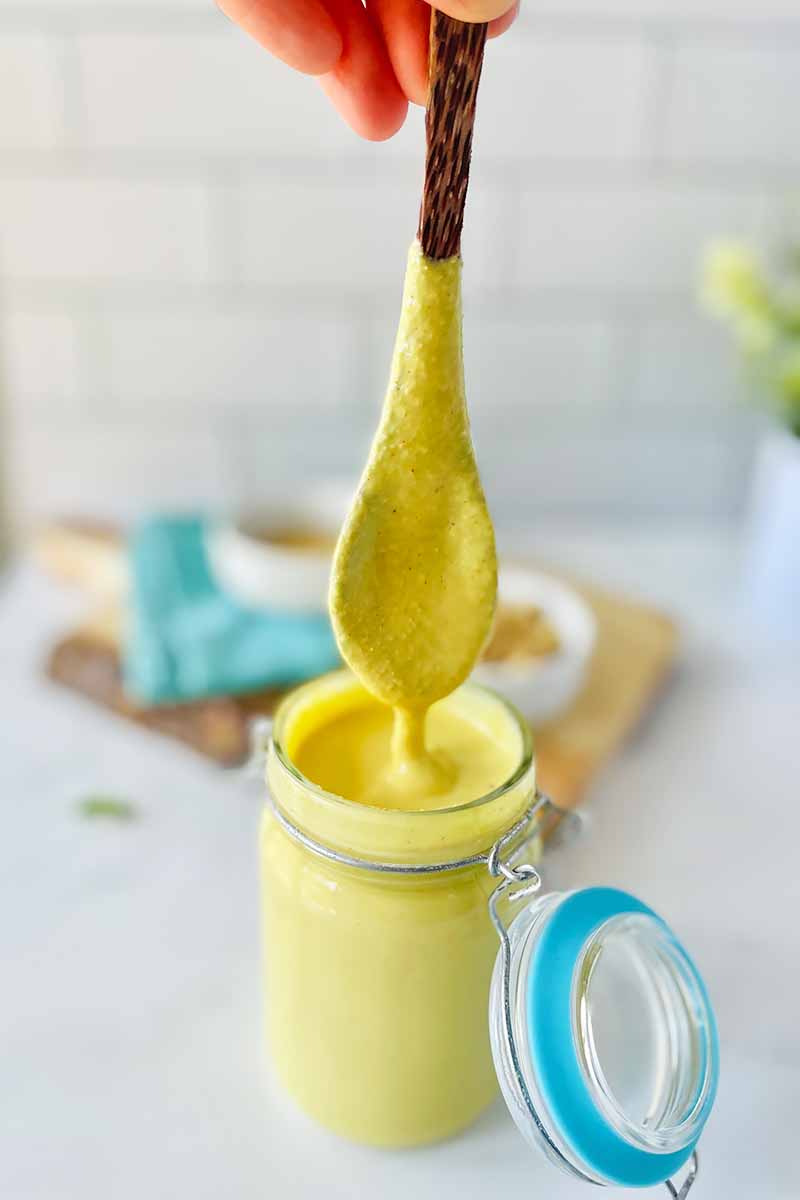
As we munched in unison, giggling over “Zoolander” for the zillionth time, it was as if time had stopped and the only thing that mattered was avoiding flinging drippy cheese sauce onto Erin’s mom’s couch cushions.
This love for queso has stuck with me through the years, so when I was tasked with making a vegan version of my most favorite condiment, I couldn’t wait to hop on board and navigate these unchartered waters.
You know, which were flowing with nutritional yeast and paprika.
It’s 2022, after all, so plant-based cheese is no longer an unheard-of product. Even if you don’t follow a dairy-free diet, being vegan-curious is totally normal nowadays. And while there are plenty of varieties of homemade vegan cheese to choose from, beginning with a cashew base is one of the most well-known routes to take.
If you’re wondering who made that particular nut the spokesperson for vegan cheese, the answer is, well, pretty much everybody.
Cashews are rich and full of fat, with a completely neutral taste – particularly in comparison to other types of nuts that are often used as dairy alternatives.
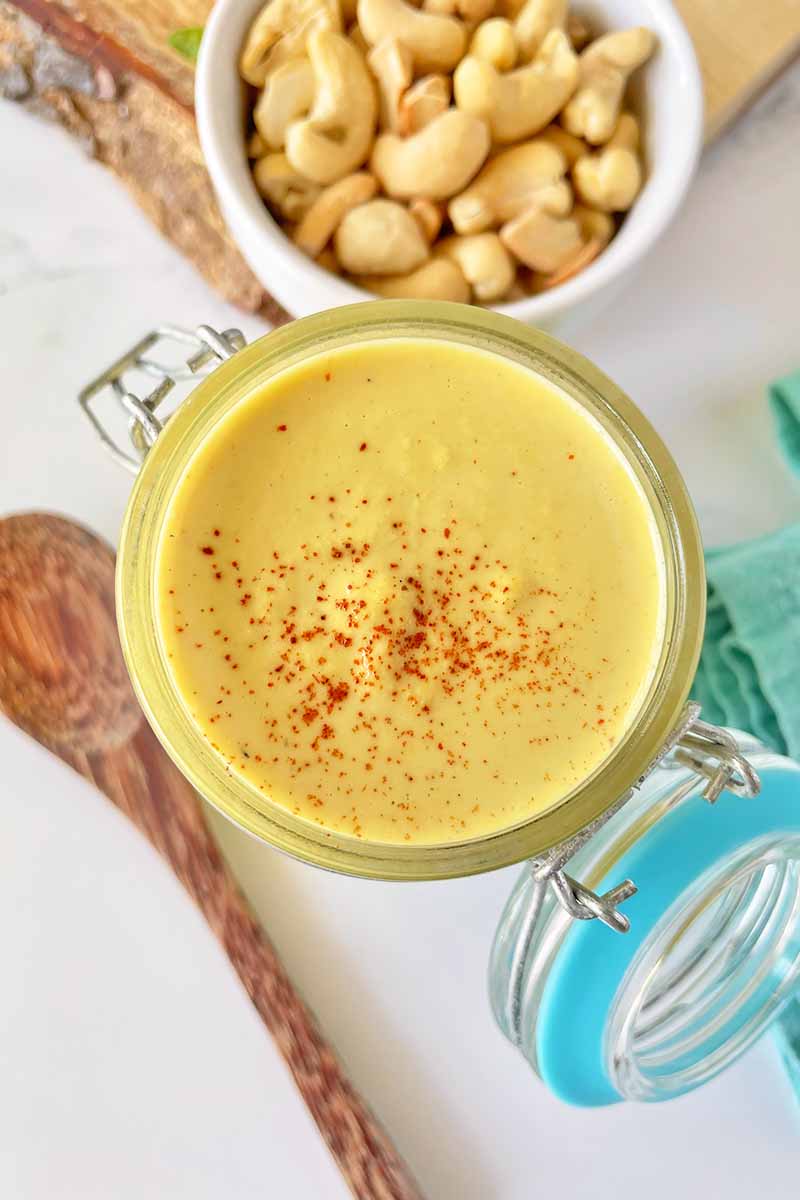
Whether you want a thickened salad dressing, fluffy cream to dollop onto your baked potato, a vegan pasta sauce option, or ooey-gooey cheese sauce to enjoy with tortilla chips (like yours truly), cashews are a stellar pick.
But the soaked, blended nuts can’t take all the credit here. The nutritional yeast is the main element responsible for packing that cheesy tongue punch that I couldn’t imagine was possible to replicate without the real thing – prior to trying this recipe, that is.
While the cashews convey that distinctively lush mouthfeel, nutritional yeast carries the cheesy flavor torch that truly leads the way. The additional spices, like garlic powder and smoky paprika, take on the important roles of tricking your brain with familiar seasonings that are often found in cheesy goods of this variety.
Not only is this cheezy recipe (cheezy because it resembles cheese, but isn’t) ideal for those who partake in a vegan diet, the added health benefits make it a great choice for anyone.
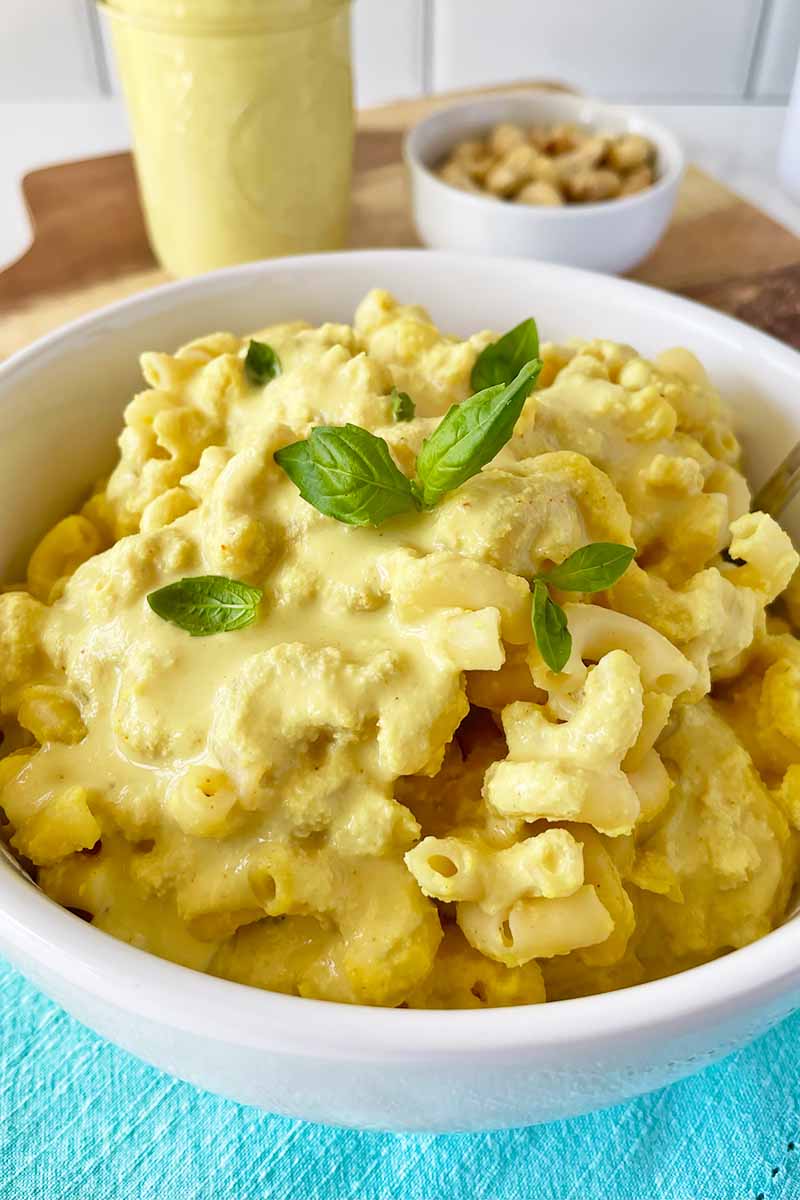
Thanks to the cashews, the sauce is loaded with protein, fiber, vitamins, and minerals. Additionally, the nutritional yeast is packed with B vitamins which help to promote healthy metabolism, energy levels, and brain function.
So go nuts with this nut-based sauce. Even I, a self-proclaimed fanatic for classic American cheese queso, have taken a dip into these cheezy waters and I’ll promise you that there’s nothing but a deliciously rewarding experience here. All the way to the bottom of the chip bowl.
Spread, smear, or drizzle it over anything that typically screams for cheese. Use it for dunking pretzels, dipping veggies, or twirling noods.
If that last visual either doesn’t make you laugh or light a fire under you to get in the kitchen and uncover the possibilities of this cashew cheezy sauce, you’re on your own. But in addition to dip, the pasta-bilities are real.
Print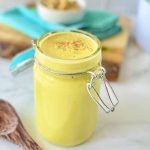
Vegan Cashew Cheezy Sauce
- Total Time: 45 minutes
- Yield: Approximately 4 cups (16 servings) 1x
Description
If you’re looking for a versatile vegan sauce to drizzle over chips or toss with pasta, you’ll love our rich cashew cheezy sauce.
Ingredients
- 2 cups raw unsalted cashews
- 1/2 cup unsweetened plant-based milk (such as cashew), divided
- 1 cup hot water, plus more if needed
- 1/2 cup nutritional yeast
- Juice of 1 lemon (about 3 tablespoons)
- 1/2 teaspoon coarse salt, plus more to taste
- 1/2 teaspoon garlic powder
- 1/2 teaspoon onion powder
- 1/4 teaspoon dry mustard powder
- 1/2 teaspoon smoked paprika
Instructions
- Fill a medium saucepot with water and bring it to a boil. Add the cashews. Turn off the heat, cover, and let the cashews soak for about 30 minutes. Drain and transfer the softened cashews to a high-speed blender or food processor. Place the pot back on the stove – we’ll use it again in a few minutes.
- To the blender, add the plant-based milk, nutritional yeast, lemon juice, salt, garlic powder, onion powder, mustard powder, and paprika. Blend, dripping in a few tablespoons of hot water at a time, until a silky sauce forms. Season to taste with additional salt if necessary.
- Transfer to the saucepot and place it over medium-low heat. Whisk to keep the mixture creamy and smooth as it heats up. Once it begins to bubble slightly, slowly add more hot water as needed, a teaspoon or so at a time, until the sauce is thinned to your desired consistency.
- Serve as a dip for chips, veggies, or pretzels, or toss with pasta.
- Prep Time: 10 minutes
- Cook Time: 5 minutes
- Category: Sauce
- Method: Stovetop
- Cuisine: Vegan
Keywords: vegan, cashew, cheese, sauce, dip
Cooking By the Numbers…
Step 1 – Gather and Measure Ingredients
Measure out the cashews, dairy-free milk, and nutritional yeast. Some nutritional yeast flakes are enriched with added B-vitamins which will give you a vibrant yellow color, similar to your typical cheese sauce.
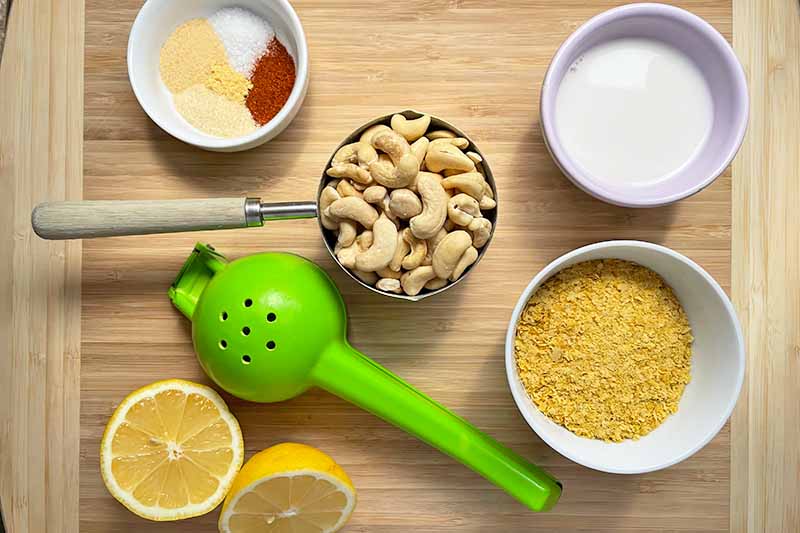
If your nutritional yeast doesn’t give you the brightness you’re looking for, you can add about 1/4 to 1/2 teaspoon ground turmeric to enhance the color. Its earthy flavor will add to the deliciousness of the finished product even more, just be careful not to overdo it – a little goes a long way.
Feel free to use more plant-based milk instead of water for thinning the sauce. Whatever variety you use, just make sure it’s unsweetened and unflavored.
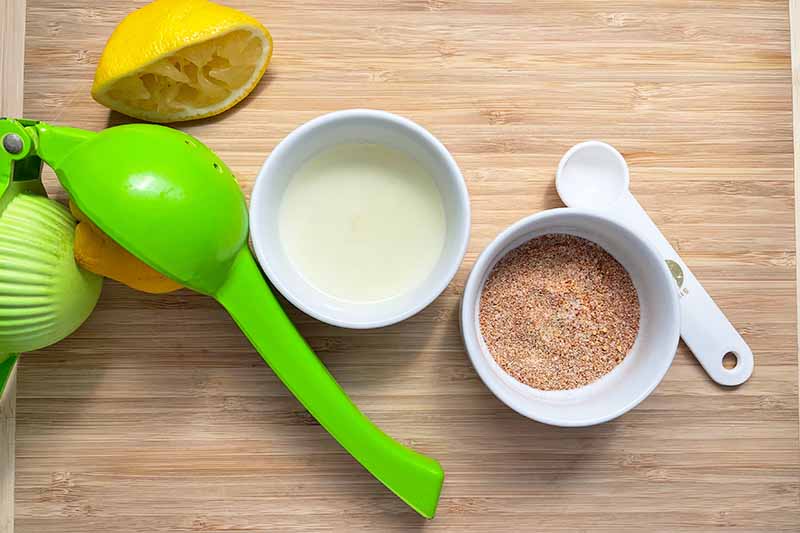
Juice the lemon and make the spice blend. If onion salt is all you have on hand instead of onion powder, reduce the total amount of salt by 1/4 teaspoon to balance it out.
The lemon juice provides tanginess, but you can use apple cider vinegar instead, if you like.
Step 2 – Soak the Cashews
Fill a medium saucepot with water, put it on the stove, and bring it to a boil. Add the cashews, turn off the heat, cover the pot, and allow the nuts to soak for about 30 minutes.
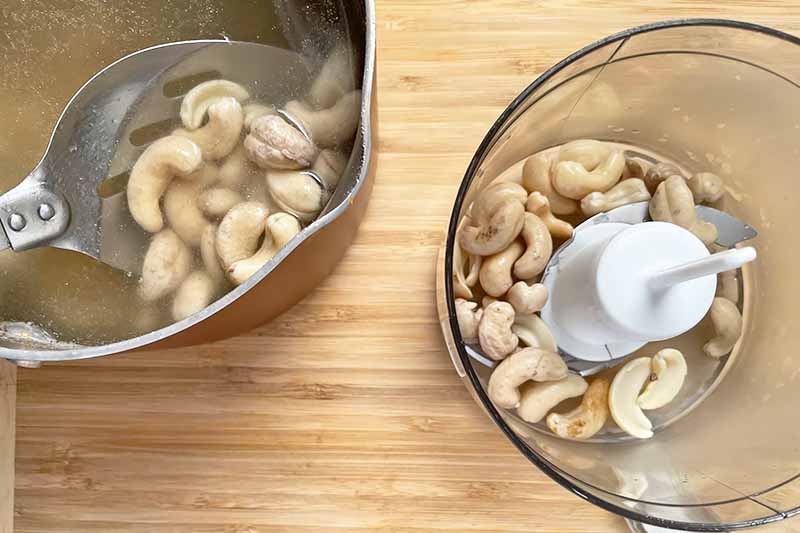
If you have the time, the cashews can also be soaked and softened overnight in room temperature water, in a container with a lid on top.
Transfer the soaked cashews to a food processor or high-speed blender. Drain the water, but keep the pot on the stove for reheating the sauce before you serve it.
Step 3 – Build the Sauce
Add the plant-based milk to the food processor along with the nutritional yeast, lemon juice, salt, garlic powder, onion powder, mustard powder, and paprika.
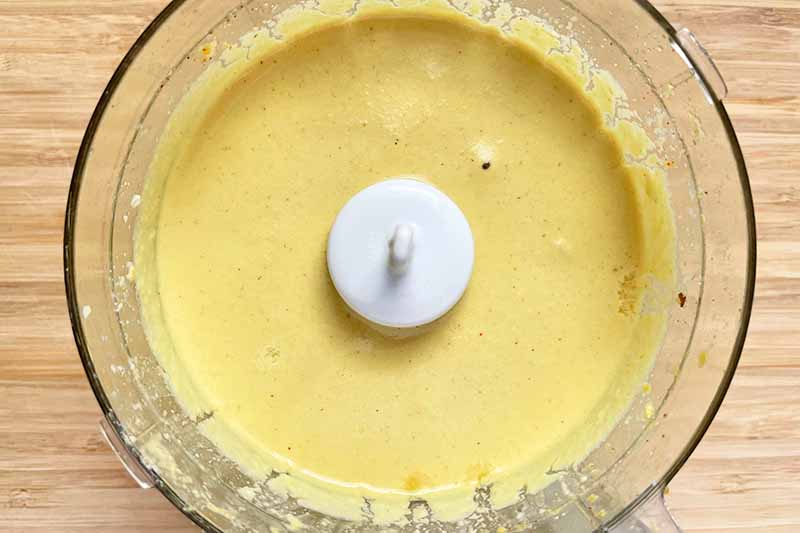
Pulse the mixture, dripping in a few tablespoons of hot water or warmed dairy-free milk at a time, until a silky sauce forms. The heat really helps to liquify the sauce, giving it that smooth consistency. Season to taste with additional salt or spices.
You can refrigerate the sauce at this point if you wish, and reheat it for later use.
Step 4 – Reheat and Serve
Transfer the cheese sauce back into the reserved saucepot and place it over medium-low heat. Whisk often as it bubbles and heats through to make sure the bottom doesn’t scorch – this can happen easily.
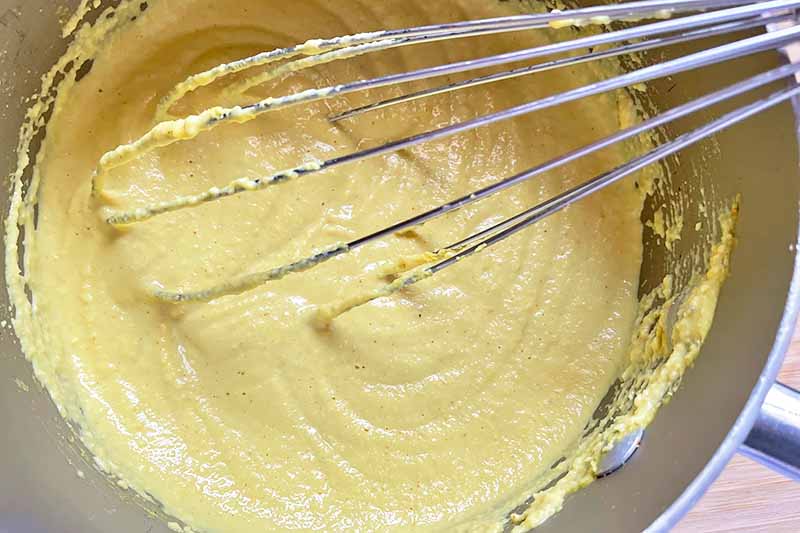
The sauce will thicken as it heats, so add water or plant-based milk gradually as needed, to thin it to your desired consistency. Cook until it’s creamy and warmed through, for about 5 minutes.
Serve as a dip for chips, veggies, or pretzels, or use it for coating pasta.
The amount of liquid you’ll need to add to thin it out depends on your desired consistency, which is ultimately based on how you’re serving it. If you’re using it as a dip, you’ll likely want a thicker finished product.
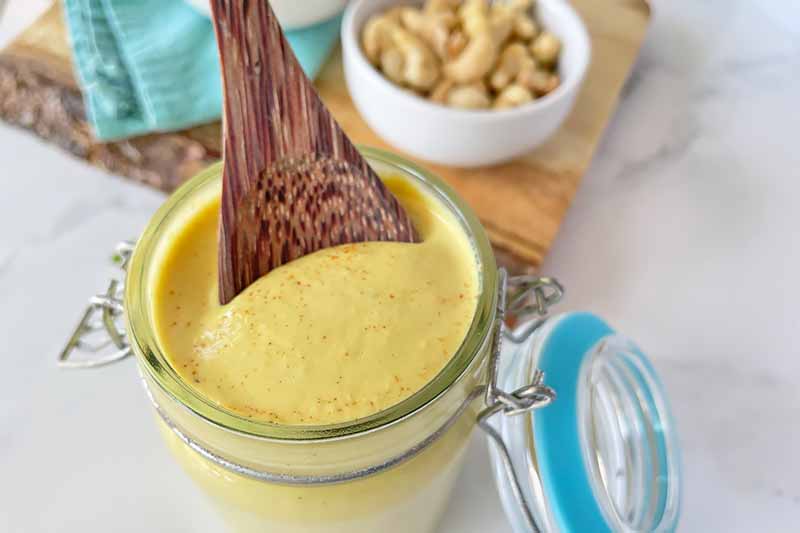
With pasta, you might want something a bit thinner– reserve about a cup of the starchy cooking water and gradually stir that in while you’re tossing the pasta with the sauce. The starchy water will help it cling to the noodles.
This May Sound Cheesy…
This sauce is truly a game changer if you’re trying to cut back on dairy products, or eliminate dairy altogether.
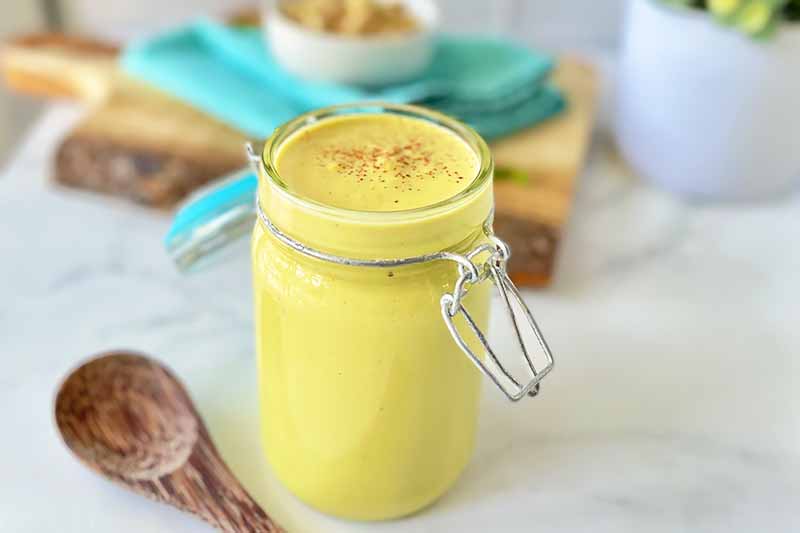
As far as the magic ingredient goes (second to the cashews, of course), the same umami-rich flavor compounds found in savory foods like parmesan and miso are also found in nutritional yeast. Hence, the mind-blowing similarities this recipe has to a classic neon-tinted cheese sauce.
How will you shake up the flavors when you make your own at home? Share your spice secrets in the comments below! And don’t forget to give this recipe a five-star rating if you loved it.
Craving more cashew-based dishes? You’ll go nuts for these recipes:
- Vegan Cashew Cream Chocolate Cheesecake
- Indian-Spiced Cauliflower Fried “Rice” With Cashews and Coconut
- Veggie Tacos with Vegan Cashew Chipotle Sauce
Photos by Fanny Slater, © Ask the Experts, LLC. ALL RIGHTS RESERVED. See our TOS for more details. Originally published by Sandy Weismann on January 3, 2015. Last updated on April 15, 2022.
Nutritional information derived from a database of known generic and branded foods and ingredients and was not compiled by a registered dietitian or submitted for lab testing. It should be viewed as an approximation.
About Fanny Slater
Fanny Slater is a home-taught food enthusiast based in Wilmington, North Carolina who won the “Rachael Ray Show” Great American Cookbook Competition in 2014, and published her cookbook “Orange, Lavender & Figs” in 2016. Fanny is a food and beverage writer, recipe developer, and social media influencer. She was a co-host on the Food Network series “Kitchen Sink,” was featured on Cooking Channel’s longtime popular series “The Best Thing I Ever Ate,” and continues to appear regularly on the “Rachael Ray Show.”

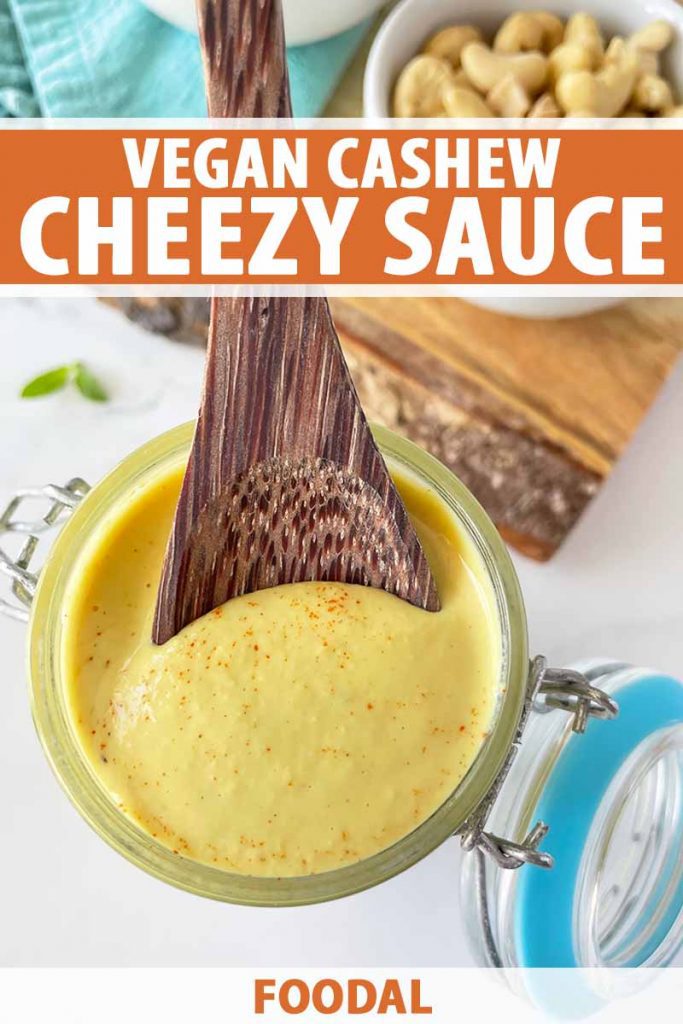
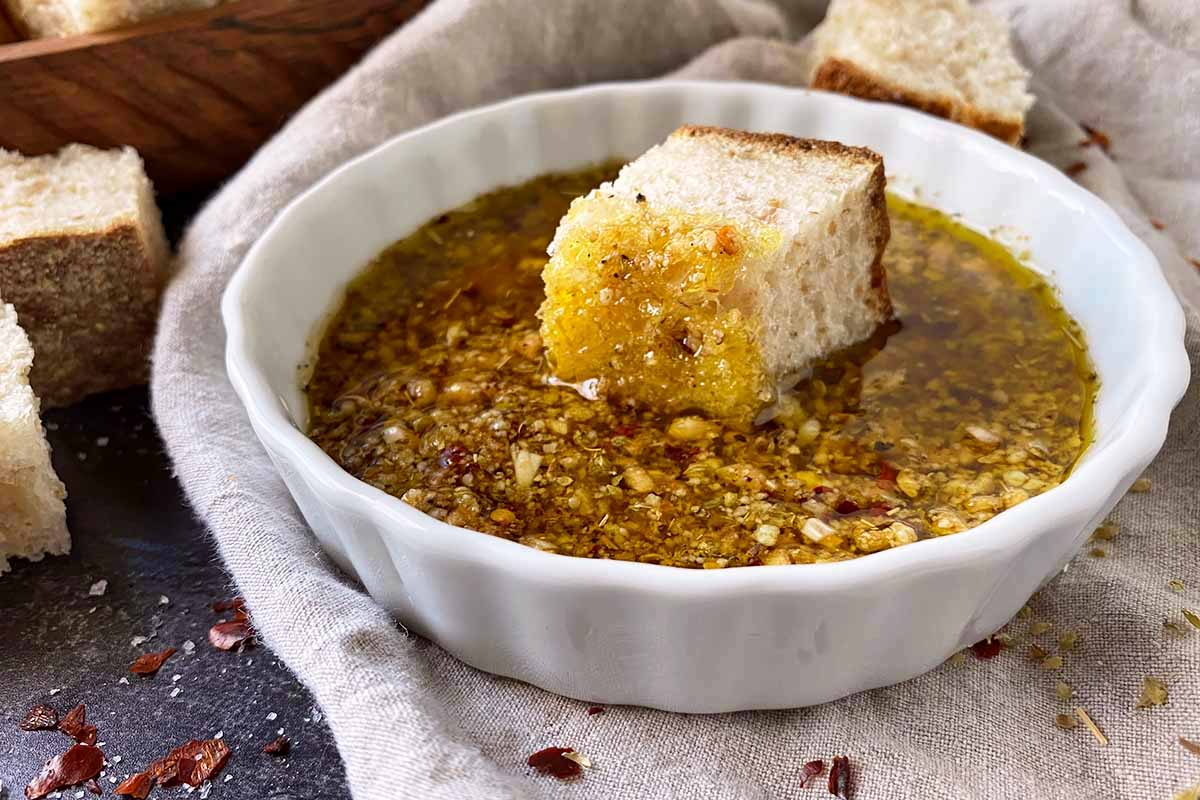
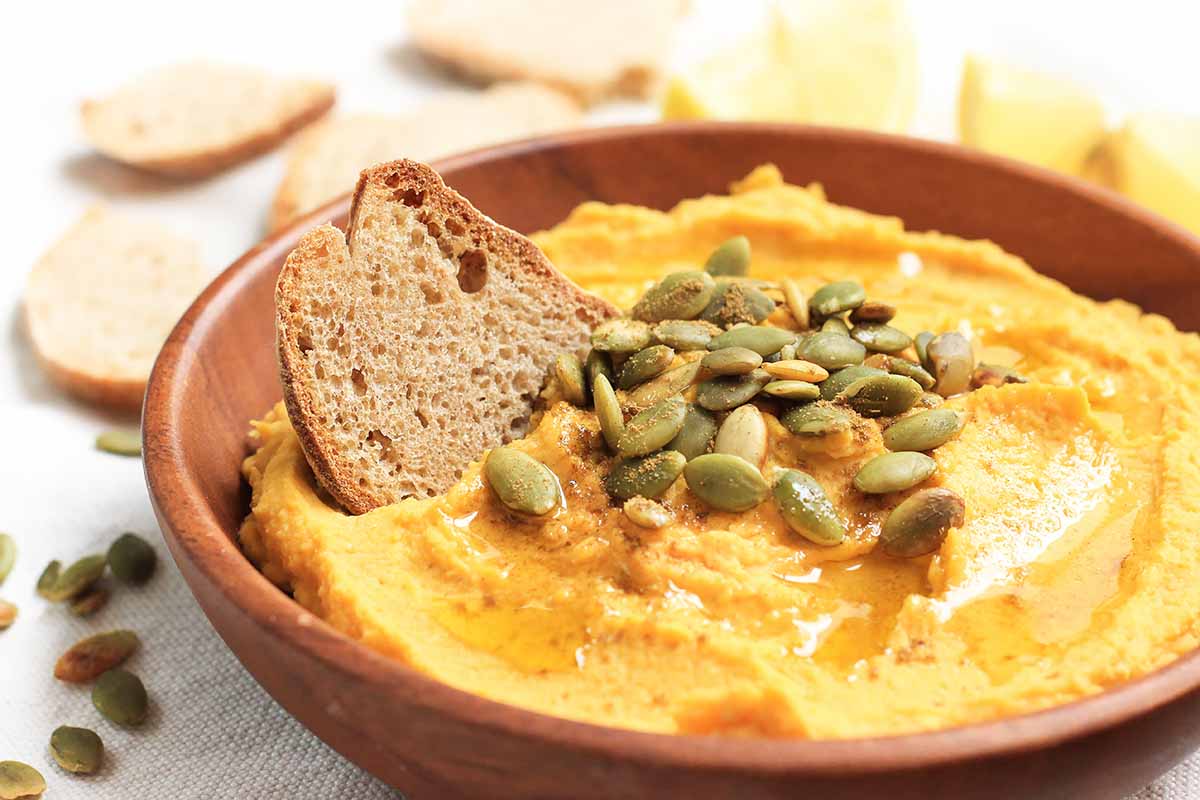
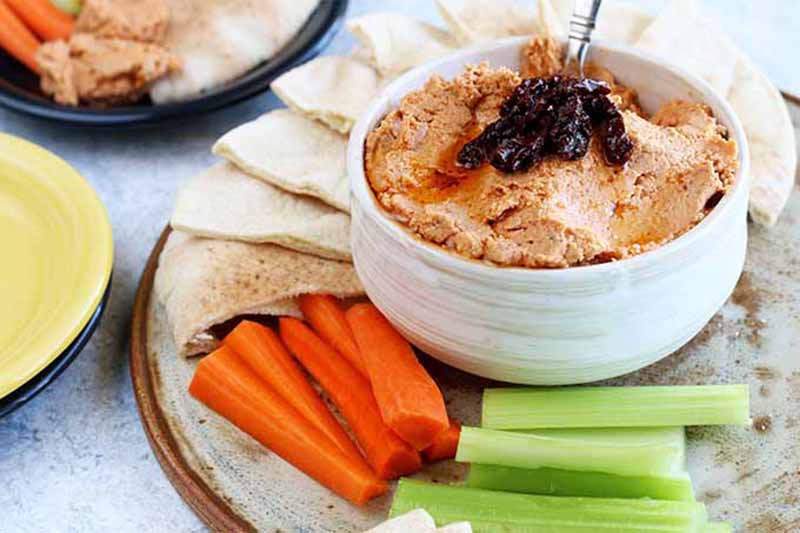
How long does this sauce last in the refrigerator, and can it be frozen.
This sauce can be refrigerated for 5-7 days, or frozen and then thawed in the refrigerator overnight before using. You may need to adjust it with a few teaspoons of water before serving if it thickens in storage.